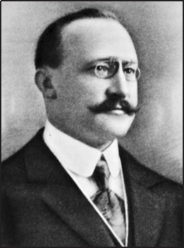- WILHELM
- FRANCE (see also List of Individuals)\
 13.1.1867 Moscow/RU - 1.8.1951 Gap/F\Ivan Wilhelm was born in Russia. After technical education at Ecole Polytechnique and at Ecole des Ponts et Chaussées, he was stationed in Gap from 1893 until 1912, from where he moved to Grenoble as a chief engineer in the Corps. After World War I, Wilhelm joined the French High Commissionariat in Syria. He retired in 1927 to Grenoble. Wilhelm presided over the French Société d'Etudes from 1903 to 1907.\From 1896, Wilhelm was involved in the hydroelectric equipment and thereby greatly in charge of the Serre-Ponçon Dam on Durance River. Serre-Ponçon is today the second largest artificial dam in Europe with a reservoir containing 1.2 × 109 m3 of water volume and covering 2,800 hectares of surface. It supplies 16 hydropower stations and provides some 10% of the total French hydroelectricity. This dam is also important in terms of irrigating Southern France, supplying some 150,000 hectares of cultivated land via the Durance Canal. It further supplies drinking water to the cities of Sisteron and Marseille, among many other communities in the Var Department. The idea of erecting this dam was already presented in 1856, after large floods on Durance River have had a devastating effect. Later, in 1895, the proposal was advanced after a great drought. The action of Wilhelm then set in: His perseverence and technical qualities finally convinced the authorities to study the project. Wilhelm fighted against the underground conditions, consisting of massive rock below a narrow gravel bed, preventing the application of the then current dam engineering methods. The project was accepted in 1922 but works started only after World War II, and the earth dam was taken into service in 1960, nine years after its promoter Wilhelm had passed away. His 1916 publication analyses the effect of reservoirs on flood mitigation, a topic of constant concern in hydraulic engineering.\Dioque, G. ed. (1996). Wilhelm Ivan. Dictionnaire biographique des Hautes-Alpes: 396.Dioque: Rueil-Malmaison. PWilhelm, I. (1902). Climatologie, hydrologie. 1 Congrès de la Houille Blanche Grenoble: 147- 161.Wilhelm, I. (1916). Du rôle des réservoirs dans la régularisation des cours d'eau. Annales des Ponts et Chaussées 86(6): 274-293.Wilhelm, I. (1919). La Durance. Laveur: Paris.Wilhelm, I. (1929). L'entraînement des graviers dans les rivières à courant rapides. Bulletin de la Société Scientifique du Dauphiné 50: 391-393.
13.1.1867 Moscow/RU - 1.8.1951 Gap/F\Ivan Wilhelm was born in Russia. After technical education at Ecole Polytechnique and at Ecole des Ponts et Chaussées, he was stationed in Gap from 1893 until 1912, from where he moved to Grenoble as a chief engineer in the Corps. After World War I, Wilhelm joined the French High Commissionariat in Syria. He retired in 1927 to Grenoble. Wilhelm presided over the French Société d'Etudes from 1903 to 1907.\From 1896, Wilhelm was involved in the hydroelectric equipment and thereby greatly in charge of the Serre-Ponçon Dam on Durance River. Serre-Ponçon is today the second largest artificial dam in Europe with a reservoir containing 1.2 × 109 m3 of water volume and covering 2,800 hectares of surface. It supplies 16 hydropower stations and provides some 10% of the total French hydroelectricity. This dam is also important in terms of irrigating Southern France, supplying some 150,000 hectares of cultivated land via the Durance Canal. It further supplies drinking water to the cities of Sisteron and Marseille, among many other communities in the Var Department. The idea of erecting this dam was already presented in 1856, after large floods on Durance River have had a devastating effect. Later, in 1895, the proposal was advanced after a great drought. The action of Wilhelm then set in: His perseverence and technical qualities finally convinced the authorities to study the project. Wilhelm fighted against the underground conditions, consisting of massive rock below a narrow gravel bed, preventing the application of the then current dam engineering methods. The project was accepted in 1922 but works started only after World War II, and the earth dam was taken into service in 1960, nine years after its promoter Wilhelm had passed away. His 1916 publication analyses the effect of reservoirs on flood mitigation, a topic of constant concern in hydraulic engineering.\Dioque, G. ed. (1996). Wilhelm Ivan. Dictionnaire biographique des Hautes-Alpes: 396.Dioque: Rueil-Malmaison. PWilhelm, I. (1902). Climatologie, hydrologie. 1 Congrès de la Houille Blanche Grenoble: 147- 161.Wilhelm, I. (1916). Du rôle des réservoirs dans la régularisation des cours d'eau. Annales des Ponts et Chaussées 86(6): 274-293.Wilhelm, I. (1919). La Durance. Laveur: Paris.Wilhelm, I. (1929). L'entraînement des graviers dans les rivières à courant rapides. Bulletin de la Société Scientifique du Dauphiné 50: 391-393.
Hydraulicians in Europe 1800-2000 . 2013.
